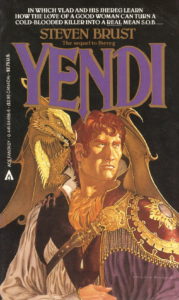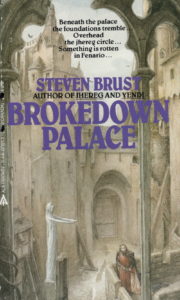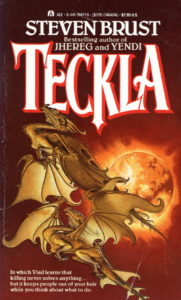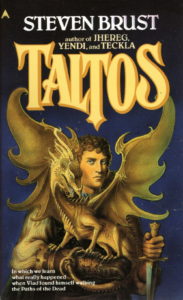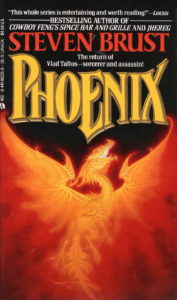Last spring I read and reviewed Steven Brust‘s first novel Jhereg, which is also the first in his Dragaeran series of novels, most of which are about the human assassin Vlad Taltos living in the house-based Dragaeran empire. Despite its short length (though not really all that short for when it was published, in the early 1980s), I was really impressed with its scope and world building, while still having a lively and textured story.
I’ve read several more in the series since then (yes yes, I am a slow reader, but these are not the only books I’ve been reading), and reached what I think is a good point to review a batch of them. Spoiler: I don’t think any of them attain the height of Jhereg, though most of them are entertaining in their own way. Consequently I don’t have as much to say about each of them as I did about Jhereg, so I’m covering them all in this entry.
I’ll try to keep this spoiler-light.
Yendi, MMPB, Ace, © 1984, ISBN 0-441-94456-6
These early novels in the series are published out of chronological order. In Jhereg, Vlad is an established mid-level mafia boss for the Jhereg, he’s married to a woman named Cacti, and he has powerful Draegarian sorcerer friends. Yendi takes place a number of years earlier, when he’s a low-level boss, and gets into. turf war with a rival boss. The early chapters spend a lot of time on Vlad’s territory (including a map!) and organization, and it is, frankly, kind of dull.
It gets more lively when his rival starts trying to assassinate him, which leads to him meeting and falling in love with Cawti, while he’s convalescing from one attempt. The two fall head over heels in love (and into bed) with each other, and while I understand that this happens sometimes, it felt very abrupt and unlikely. I would have chalked it up to an awkward moment in the story which didn’t quite work, except that it unfortunately sets the tone for Cawti’s presence in the series: She’s not really there as a character, we never get a feel for Vlad’s relationship with or love for her – it’s mostly told and not shown. She feels less fleshed out than Sethra Lavode, who only appears in a few scenes across all these books.
The story otherwise is structured as a mystery/puzzle similar to Jhereg, but while the final conflict is lively enough, the reveal of who’s behind it feels not at all well set up. This is in keeping with the spirit of the Yendi house in Dragaera, but it doesn’t work well in a story of this sort.
While most of the Vlad novels are named after Dragaeran great houses, Yendi seems an odd choice of title for this one. Sure, the villain is a Yendi, but it’s such a small part of the book, and doesn’t even seem to capture the spirit of the story overall that it feels forced. This isn’t the first time I’ll feel this way about the title.
Brokedown Palace, MMPB, Ace, © 1986, ISBN 0-441-07181-3
This is not a Vlad novel, but takes place an indeterminate – but large – number of years earlier, in the Eastern lands of Fenario that Vlad’s human family hails from. Fenario is ruled by the eldest of four brothers, Kind Laszlo, with the middle two as his right-hand men. His youngest brother, Prince Miklos, has a strained relationship with him. The family’s difficulties are also embodied in the the decaying palace in which they live, problems which Miklos perceives but Laszlo feels defensive about, further straining their relationship. Following an especially violent falling out, Miklos spends a couple of years in the west, in the lands of Faerie – which we know are Dragaera – and returns to try to save his family and homeland.
The story has the feel of a lengthy fable, with characters which feel like archetypes rather than rounded people, and events which often seem arbitrary and portentous, leading to a climax which seems like it should be meaningful but felt empty to me. I’ve read that the book is pretty polarizing, so put me on the side of those who didn’t enjoy it so much. Many of the details of the setting show up in the later Vlad novels, so in that sense I’m glad to have read it, but I’d say it rates at the bottom of the books in the series I’ve read so far.
Teckla, MMPB, Ace, © 1987, ISBN 0-441-79977-9
Teckla takes place not long after Jhereg. Cawti gets involved with some revolutionaries in South Adrilankha – the section of the city where most of the Easterners (i.e., humans) live, including Vlad’s grandfather. Humans and the Teckla house are oppressed in Dragaeran society, and the revolutionaries want to end the oppression. Trying to keep Cawti from getting killed, Vlad gets tangled up with the Jhereg boss who’s attacking them, as well as the revolutionaries themselves, including their leader, Kelly, even as his marriage is disintegrating.
There are a lot of moving pieces to this one, but the overall impact is badly undercut by Cawti still being just a shadow of a character, and us having very little insight or investment in her and Vlad’s relationship. Their struggles feel very true-to-life – Vlad doesn’t understand Cawti’s behavior, he’s driven to try to protect her whether she wants it or not, and he makes some bad decisions as a result – but it’s just not a very good story. The thread of the oppression of the lower classes would be plenty on its own, maybe even better if Cawti wasn’t involved, or if they didn’t have such a big wall between them. But, it is what it is. The ending feels too pat, but I think this volume is largely about putting storylines in motion.
Taltos, MMPB, Ace, © 1988, ISBN 0-441-18200-3
Taltos again rolls back the clock and takes place even before Yendi, when Vlad is a fairly new member of the jhereg. It’s the most enjoyable entry since Jhereg, even if it is mostly filling in missing pieces to his background. The main story explains the origins of his friendship (or is ‘alliance’ a better term?) with Morrolan, Aliera and Seth Lavode. Interspersed are passages which detail his life from childhood to joining the Jhereg, about his father and grandfather and developing his hatred of Dragaerans.
Unlike earlier novels which have a “vexing puzzle to solve” structure, this one has a combination of coming-of-age and mythic-quest structure, which gives it a rather different feel. The coming-of-age part feels more organic and satisfying, while the later mythic-quest part feels a bit preprogrammed (as these stories often do – it’s why I don’t care for The Dark is Rising, which takes that fault to the extreme), though it does humanize Morrolan considerably over his previous appearances. In the aggregate it does a lot to tie together the different pieces of Vlad’s life and personality – all the pieces except his marriage, really. If anything his life as an assassin feels like it never got explored as deeply as it could have, which is a shame since that part of his life takes a sharp turn in the next book.
Phoenix, MMPB, Ace, © 1990, ISBN 0-441-66225-0
This volume brings us back to the events following Teckla, but quickly head off in a surprising direction when the Demon Goddess of Vlad’s Fenarian heritage personally hires Vlad to kill the king of an island some distance from the empire. Vlad does this, but has to be rescued by Morrolan, Aliera and Cawti when he’s unable to get away – a good trick since most sorcery is blocked on the island, including most teleportation. The assassination leads to war between the Empire and the island, which in turn escalates the conflict between the Empire and Kelly’s revolutionaries, which in turn put’s Cawti at risk and forces Vlad to try to protect her.
The story jumps all over the place, and ends with one of Vlad’s more daring gambits to “solve” the problem. It also raises serious questions about the roles of deities in Dragaera (the risk when bringing gods into a story as characters is that you inevitably see them as having their own motivations and foibles, and we certainly get that here; they’re really just much more powerful characters. But perhaps that’s what Brust is going for, showing that the fable-like feel of Brokedown Palace isn’t really how things are). But it is definitely lively.
Phoenix seems to mark the end of the first phase of the series, as Vlad leaves the Jhereg and puts his old life behind him – or at least announces his intent to do so; I guess the book is called Phoenix is because he’s experiencing a rebirth. It feels like the end of the first act in a larger story, setting up whatever follows. (The house of the Phoenix plays no real role in the story.) I’m not really going to miss the Jhereg (other than Vlad’s lieutenant, Kragar, who is the most entertaining character in this slice of Vlad’s life), and Vlad’s role as a mafia boss has been feeling increasingly fraught for the nominal hero of the series (to be fair he was getting uncomfortable with his job a bit at a time over a few novels). Of course I won’t miss Cawti either (though I expect she’ll show up again). I bet we’re heading into more serious Dragaeran territory next, which means more of Morrolan, Aliera, and Seth Lavode. Which is fine with me as they’ve been the most interesting members of the supporting cast.
I think these novels feel more like an author’s early novels than Jhereg did, fumbling around a bit trying to figure out what their ultimate direction is, or maybe just the right way to head there. Despite their flaws, I’m looking forward to what comes next.
ETA: If you’re curious what I think of what comes next, you can read my review of the next arc of the series.

